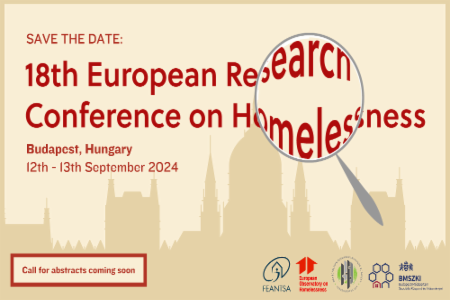.png)
Hotels to Homes: As the EU regenerates its tourism industry, homeless people must not be left without solutions
Many of us are hoping to have somewhere to go this summer, for some of us that is no more than a permanent home. As the European Union pulls out all the stops to regenerate the tourism industry in the wake of the Covid-19 pandemic, we ask that it direct some of its energy and resources towards providing permanent solutions for homeless people, many of whom will be giving up their temporary accommodation in hotel rooms and Airbnb’s as tourists move in.
Within weeks of the coronavirus outbreak, many municipalities were able to find temporary crisis accommodation quickly for a large part of their homeless population. In London, as in Dublin, Barcelona, Prague and elsewhere, they provided shelter for homeless people by employing hotels, holiday homes and Airbnb properties, as well as emergency shelters. As the threat of Covid-19 recedes many of these cities will be turning their attention to reopening their tourist industries, from which they have much to gain, and some will be asking the homeless people in temporary crisis accommodation to move on. The question is – will this move be to permanent housing, or back onto the street or into inadequate accommodation?
Since moving beyond the initial management of the public health crisis, the European authorities have been working hard to help Member States “save the season” and regenerate Europe’s tourism industry, injecting billions of euros into the sector, publishing detailed guidance, and bailing out airlines. As early as May 13, the Commission released guidance on “how to safely resume travel and reboot Europe's tourism in 2020 and beyond,” which includes guidance for hotels wishing to reopen. They have given no indication, however, that they will release any form of guidance on what to do for the tens of thousands of homeless people who have been accommodated in these hotels during the confinement because of a lack of safe alternatives. As plans to regenerate the tourism industry implicate homeless people and their access to accommodation – a basic right – it is unthinkable that homeless people be left out of these plans. Why not make EU financial support conditional upon providing permanent housing solutions for homeless people accommodated in hotels?
A change in attitude towards homelessness is palpable and evidence suggests the magnifying effect of coronavirus has made the difference. In the midst of the Coronavirus crisis, the Dutch government saw an opportunity for change, and is now launching a new homelessness strategy that aims to house homeless people permanently. The Welsh housing minister has announced she is ‘absolutely determined’ homeless people will not have to go back on to the streets after the coronavirus pandemic. The municipality of Lyon has committed to a zero return to the street policy. On a European level, Portuguese Minister for labour, Solidarity and Social Security, Ana Mendes Godinho and European Commissioner for Social Rights, Nicolas Schmit, co-wrote an opinion piece committing to stronger European action on homelessness in the framework of the Action Plan for the European Pillar of Social Rights. But this is just the beginning. A long-term solution to homelessness requires support and investment from across the European institutions.
As the European Union races to “save the season,” we ask that they step up and take responsibility for the 700,000 people who are homeless in the EU on any given night, by ensuring that MS provide permanent solutions to homelessness. Whether aimed at holiday makers or people experiencing homelessness, the instruction to “pack your bags” should be a positive one. For those accommodated in temporary crisis accommodation it should mean “you have a permanent home to go to.”





